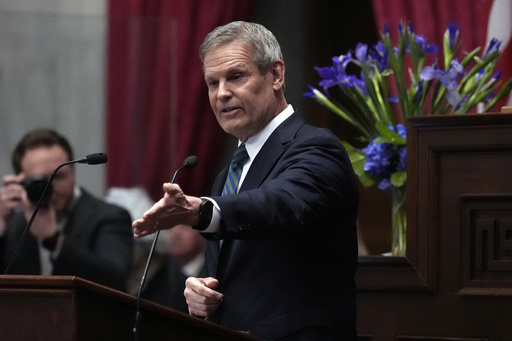
NASHVILLE, Tenn. — Governor Bill Lee of Tennessee unveiled a proposal on Monday that aims to inject over $1 billion into road construction projects in an effort to tackle the state’s extensive backlog of $30 billion in infrastructure needs. This plan will rely heavily on funding beyond the typical gas taxes and associated fees.
The Republican governor’s budget initiative encompasses nearly $1 billion in one-time general state tax allocations, alongside a strategy to redirect $80 million annually from sales tax collected on tires. This proposal arrives two years after a similar initiative was approved that allowed for a $3 billion reallocation of general tax funds to support roadway funding, typically financed by fuel taxes.
In the context of Lee’s comprehensive $59.5 billion budget request for the upcoming fiscal year starting in July, road funding emerges as one of the primary components. The state’s financial situation has grown tighter due to a decline in tax revenue compared to the surge experienced during the COVID-19 pandemic.
“Providing safe and dependable roads is a fundamental obligation of our state, and yet we find ourselves with limited resources to meet an overwhelming demand,” Lee stated in his prepared remarks during the annual State of the State address on Monday evening.
Some aspects of the budget have already seen allocations made following a brief special session last month. Lee successfully urged lawmakers to approve over $900 million in initiatives sourced from various funding streams. These include substantial voucher expansions intended to assist students in attending private schools, alongside bonuses for public school teachers, disaster relief for areas impacted by Hurricane Helene, and measures aimed at assisting the federal administration’s immigration enforcement efforts.
In 2023, Lee prioritized infrastructure projects by making $3 billion available for roadwork and increasing fees for electric and hybrid vehicles. This budget also proposed the introduction of express toll lanes on highways through public-private partnerships, a concept that has yet to be realized, although discussions are ongoing about a segment of Interstate 24 connecting Nashville and its southeastern suburbs.
Tennessee is not an outlier in this situation. Numerous states are seeking alternatives to augment their gas tax revenues, as these funds are becoming increasingly inadequate to meet the demands of infrastructure maintenance, particularly with the rise of electric and hybrid vehicles.
Democratic representatives criticized Lee’s priorities, including a tax cut and refund for businesses amounting to nearly $2 billion that was enacted in the previous year. They asserted that such decisions could lead to expensive legal challenges. “Billion-dollar handouts for people with private jets seem to be their priority — not for middle-class families,” remarked Democratic Rep. John Ray Clemmons from Nashville prior to the address.
Additionally, Lee proposed an allocation of $11 million toward the Boys and Girls Club to enhance childcare services and expand access to a state program designed to supplement salaries for childcare workers. “In Tennessee, the cost of infant care is comparable to in-state tuition at a public university,” Lee pointed out. “This is an overwhelming expense for many families aspiring to enter the workforce.”
He confidently asserted that his measures would create “tens of thousands of new daycare spots across Tennessee’s rural and urban areas,” yet specifics about how and when this would be realized remain unclear. Furthermore, it has been noted that many Boys and Girls Club facilities only cater to children five years and older.
In his speech, Lee also proposed a $60 million fund to provide 0% interest construction loans for the development of single-family homes. While his budget does not introduce new tax relief measures for Tennesseans, the governor expressed intentions to fund a previously enacted tax credit designed to incentivize developers focused on affordable housing initiatives. “We need to explore fiscally responsible ways to tackle our housing challenges through innovation rather than regulation,” Lee emphasized.
Additionally, tens of millions of dollars are earmarked for investments in nuclear energy. The governor’s proposal includes a $50 million commitment to assist the Tennessee Valley Authority in developing a small modular reactor, with the federal utility seeking an $800 million grant from the U.S. Department of Energy to support this project.

